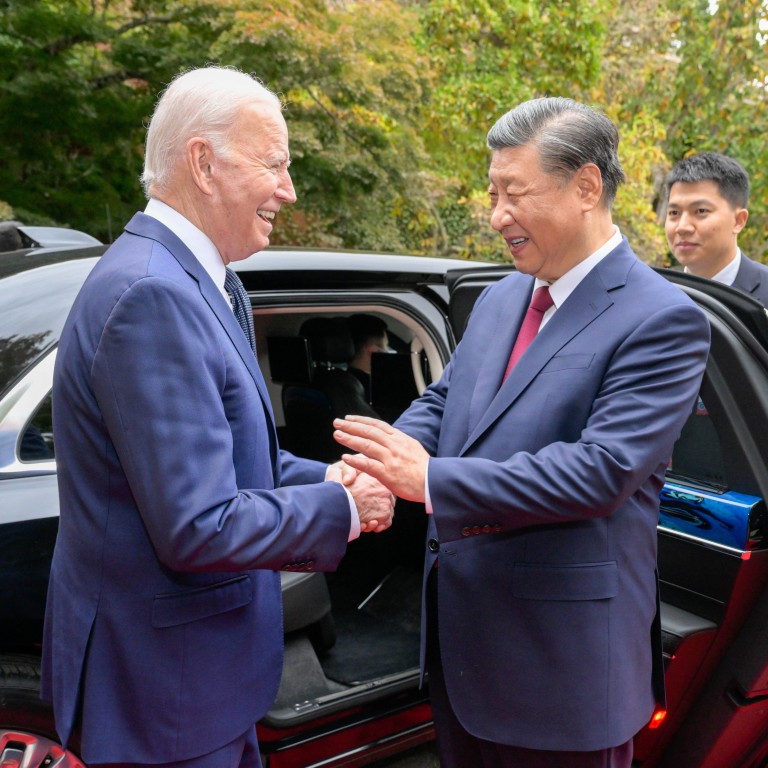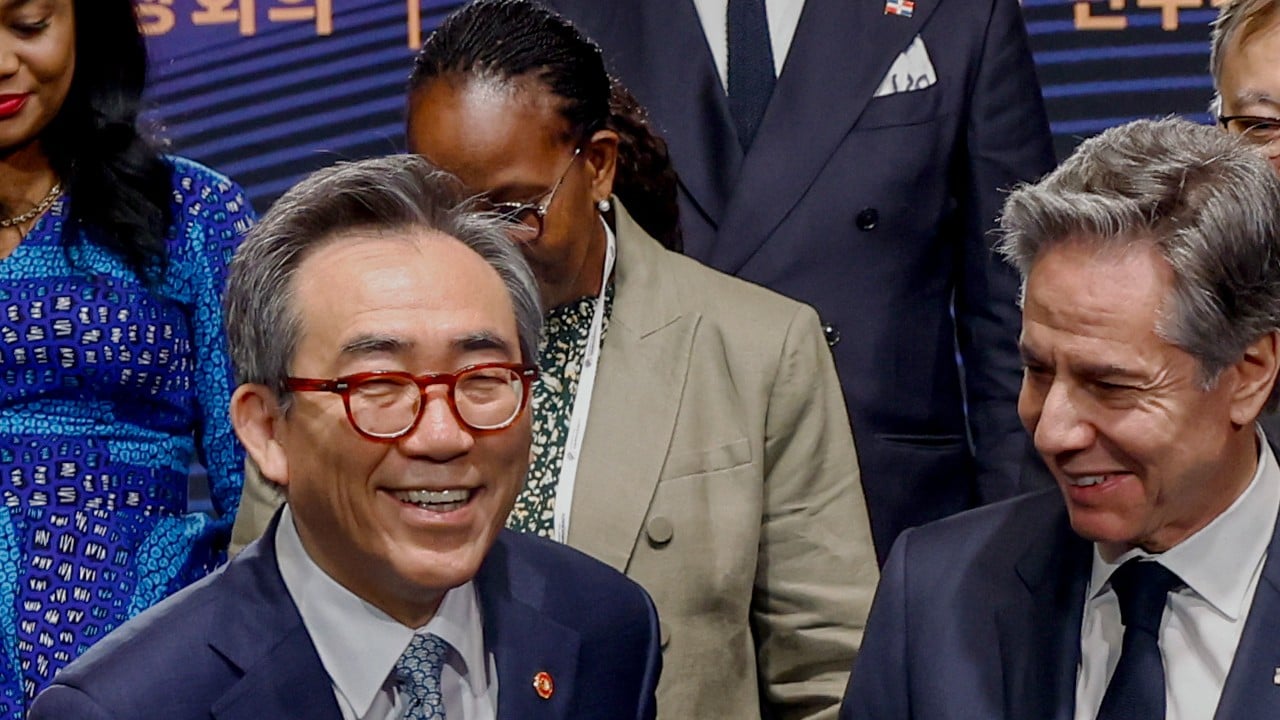
Xi-Biden call a timely talk about ‘strategic perception’ as tensions flare
- Amid a litany of thorny issues and looming US elections, both sides try to reset tone, manage differences
- Call between two leaders came ahead of meetings between diplomatic, economic and security officials
Xi Jinping and Joe Biden spoke by phone on Tuesday in a bid to stabilise ties amid rising tensions over the South China Sea, Taiwan and what Beijing has described as Washington’s “suppression” of hi-tech development.
While there appeared to be no breakthroughs on a litany of thorny issues, observers said the 105-minute conversation – the first since the Chinese and US leaders met in San Francisco in November – was “timely” and “meaningful”, and underlined their willingness to avoid mishaps or conflict.
Both sides described the call as “candid and constructive”, with Xi and Biden reaffirming the importance of strengthening high-level dialogue, while differing sharply on most geopolitical and ideological issues including Hong Kong, human rights and the Ukraine war.
According to the official Chinese readout, Xi told Biden that bilateral ties were “beginning to stabilise” despite growing “negative factors”, but warned that they could “slide into conflict or confrontation”.
US-China all-out trade war unlikely but soft-power gap will persist: Joseph Nye
In a sign of Beijing’s deep distrust of the Biden administration, Xi urged Washington to forge a correct strategic perception of China, which he said was “fundamental” and “just like the first button of a shirt that must be put right”.
He also raised the issue of credibility, in another thinly veiled jab at the Biden White House’s ability to deliver on its promises.
“The two sides should put a floor of no conflict and no confrontation under the relationship … [and] refrain from setting the relationship back, provoking incidents or crossing the line,” Xi said, invoking a metaphor that became popular among top US officials last year.
Zhu Feng, a professor of international affairs at Nanjing University, said the call came at a sensitive time for both countries.
“The most important takeaway from the call is that in the face of a series of challenges and contentious events, both sides are trying to reset the tone, which is rather pragmatic,” he said. “It’s good that they chose to talk directly because it is imperative for them to remain calm and prevent overreactions.”
Zhu noted that Xi’s messages – especially on the need for more communication and dialogue – were in line with Beijing’s approach over the past two years on how to constructively manage differences with the US.
The call came amid elevated tensions between Beijing and Manila over the South China Sea dispute, with Philippine President Ferdinand Marcos Jnr expected to meet Biden and Japanese Prime Minister Fumio Kishida next week in Washington.
Xi reiterated that the Taiwan question was “the first red line” for Beijing and “China is not going to sit on its hands” in the face of the self-ruled island’s attempts to seek independence and external support, especially from Washington.
In response, the White House statement said Biden “emphasised the importance of maintaining peace and stability across the Taiwan Strait and the rule of law and freedom of navigation in the South China Sea”.
The US statement, however, made no mention of those promises.
Instead, it said Biden raised concerns about Beijing’s support for Moscow and its defence industrial base in the midst of the Ukraine war, and China’s “unfair trade policies and non-market economic practices, which harm American workers and families”.
“The president emphasised that the United States will continue to take necessary actions to prevent advanced US technologies from being used to undermine our national security, without unduly limiting trade and investment,” the White House statement said.
Referring to “a string of measures to suppress China’s trade and technology development”, Xi voiced clear displeasure about Washington’s ever-growing sanctions lists of Chinese entities, the Chinese readout said.
“This is not ‘de-risking’ but creating risks,” he told Biden.
Despite US concerns about the country’s slowing economy and its policies targeting foreign investments, Xi insisted China’s door remained open. “[But] if it is adamant on containing China’s hi-tech development and depriving China of its legitimate right to development, China is not going to sit back and watch,” he said.
While neither side mentioned the controversy surrounding Washington’s efforts to force the sale in the US of TikTok in their statements, US national security spokesman John Kirby confirmed it came up during the call, with Biden claiming that it was not about banning the app.
George Magnus, a research associate at Oxford University’s China Centre, said all contact between Xi and Biden was significant, given “the array of potential banana skins” in Sino-US relations.
“Better to have a dialogue and manage what can be managed, and keep the rest under watchful eyes,” he said, adding the contact was aimed at defusing, or at least airing several points of rising tensions, which reflected Chinese angst about America’s China policy.
Supply chain shifts, US curbs prompt calls for rethink of China’s trade strategy
Magnus described the call as “important housekeeping” ahead of planned diplomatic and military engagements involving economic, security and defence officials.
“The great power rivalry will continue, with the US tightening technological suppression, sanctions and hi-tech restrictions on China. So the priority is to prevent tensions from spiralling out of control, especially on key hotspot issues, which may plunge bilateral ties into real crises,” he said.
Deng Yuwen, former deputy editor of Study Times, the Central Party School’s official newspaper, said Xi’s messages on strategic perception, Taiwan and US tech restrictions reflected Beijing’s concerns about the US election factor in bilateral ties.
US ‘strongly opposes’ China’s renaming of areas along disputed Indian border
“It’s part of Beijing’s strategic perceptions of where the US-China rivalry is headed in the lead-up to the US election. Clearly Beijing is concerned about the election’s possible devastating impact on bilateral ties and Xi wants to send a warning to Washington in advance,” he said.
Deng described the call as “a pre-emptive step” in the face of the possible deterioration of ties going into the November election.
“In Xi’s view, if the Biden administration does not correct its erroneous strategic understanding of China after the phone call and continues to go ahead on Taiwan and suppressing China’s science and technology development, he may have to take strong countermeasures against the US,” he said on the social media platform X, formerly known as Twitter.
Additional reporting by Ji Siqi



